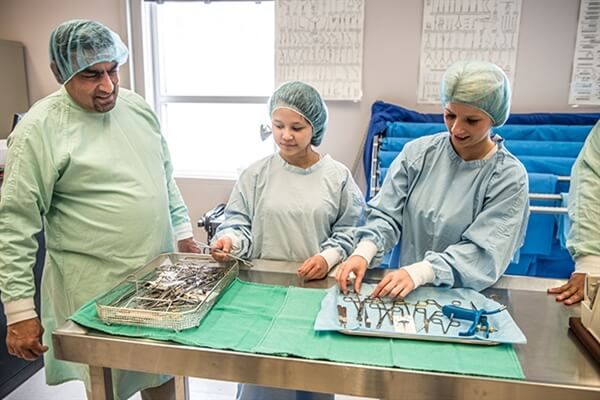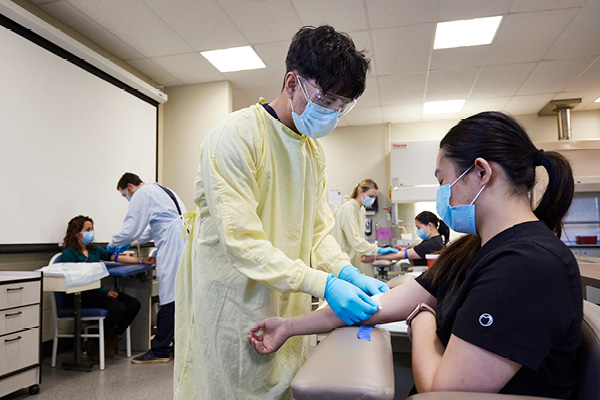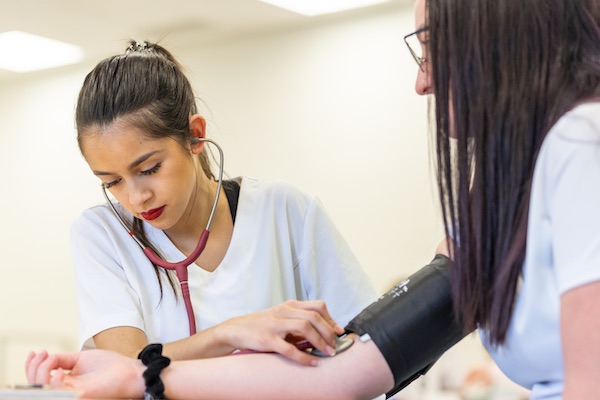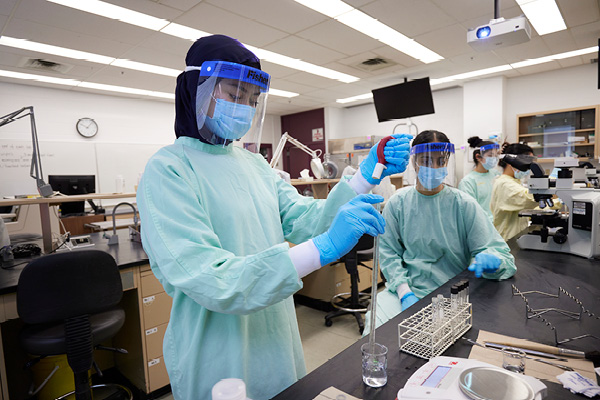On this page:
Overview
Play a critical supporting role in medicine and healthcare with our Medical Device Reprocessing Technician certificate program.
This fast-paced program provides entry-level training in decontamination, inspection, packaging, sterilizing, storing and handling sterile supplies and surgical instruments, focusing on infection prevention and control and aseptic techniques.
With an emphasis on hands-on learning, you'll spend time in simulated laboratory and real-world clinical environments, developing your professional competencies to ensure you can enter the workforce with confidence and advanced practical knowledge while working safely and professionally.
As a student, you will:
- learn the specifics of cleaning processes for various medical-surgical instruments and equipment
- gain expertise in handling surgical equipment and assembling sterilized surgical packages for use or storage
- master the use of autoclaves and other sterilization equipment
- understand the principles of sterile storage to maintain instrument integrity
- develop the skills to handle surgical equipment and instruments to perform function testing while preventing contamination
- focus on preventing infection through meticulous adherence to safety and infection control protocols
- practice the critical techniques necessary to maintain a sterile environment
- develop professional responsibility, including scope of practice, ethics, communication, critical thinking, accountability and professional collaboration.
Our graduates often work within public, private, and community-based organizations and businesses, including hospitals, surgical centres, laboratories, specialty clinics, dental clinics, and outpatient care facilities.
Based on demand, you may need to relocate outside of Calgary to secure employment.
Those in sterile processing need:
- fine motor skills
- critical thinking and adaptability
- effective communication skills
- the ability to work independently
- to work well under stress, maintain professional behaviour and emotionally self-regulate
- to be able to use technology
- attention to detail
- to tolerate the sight of human blood and tissue
- the ability to assist in transporting, lifting and positioning patients and equipment and meet the physical demands of the job (for example, using your hand, wrist and arm for prolonged periods)
- the ability to lift 40 pounds (20 kilograms) and push or pull 250 pounds (110 kilograms) frequently.
Medical device reprocessing technicians and related professionals must wear personal protective equipment (PPE) for extended periods. This includes exposure to latex and disinfection materials.
You may also be required to work extended hours and shift work, including nights and weekends.
You are strongly encouraged to refer to the ALIS website for career, learning, and employment information for surgical processors to ensure you can successfully meet the program's and profession's occupational requirements.
This program includes a required practicum. Practicums are not necessarily consecutive and may not be continuous with the end of the theory portion of the program. For example, there may be a gap between finishing your theory classes and starting your practicum.
You will be assigned practicum placements with consideration given to your preference of location. However, due to limited availability in Calgary, you might need to travel or relocate outside the city. Special considerations will not be accommodated.
In compliance with the practica agreements with our clinical partners, you will be required to provide specific documentation before you can participate in your practicum. Find out what requirements you need for this program.
This program is recognized by the Healthcare Sterile Processing Association (HSPA) and the Canadian Standards Association (CSA).
Graduates are eligible to challenge the HSPA and CSA certification exams. Program administrators will assist you in this process.
As the certification requirements for employment vary across provincial and national jurisdictions, you are encouraged to challenge both the HSPA and CSA exams in order to maximize your employability.
Upon successful completion of this program, you'll be awarded a SAIT Medical Device Reprocessing Technician certificate.
Careers and opportunities
Each year, SAIT conducts a survey between February and April to determine the employment rate, salary and satisfaction of our newest SAIT alumni.
![]() 95% graduate employment rate
95% graduate employment rate
![]() $44,200 average starting salary
$44,200 average starting salary
Find out more about our graduate employment statistics >
Our graduates may work in the following occupations. Some careers require additional experience and education.
Associated National Occupational Classification (NOC) codes: 32129, 33109.

Career planning support
Unsure which career path is for you? Here are some recommended career planning resources to help you decide your future.
You can also head to Alberta alis for lots of information about careers in Alberta, including quizzes and labour market information to help you narrow down a path.
Finally, you can take our online career finder quiz, which can help narrow your options based on your current skills and interests.
Courses
The Medical Device Reprocessing Technician certificate requires 18 credits (six courses) to complete.
| Course | Credits |
|---|---|
|
This applied computer course provides students with critical electronic communications, data and file management skills, along with a strong focus on using common productivity applications to format, calculate, analyze, visualize, and present or report data and information. Equivalents:
|
1.5 |
|
Practicum focuses on the application of theoretical concepts and professional practice experience in a medical device reprocessing department. Students will also receive instruction on how to prepare for a comprehensive theory exam and professional certification. Pre-requisites:Concurrent Prerequisite
|
6 |
|
This course provides learners with an opportunity to apply foundational medical device reprocessing skills, as well as human relations and communication skills, while working as a team member in a simulated medical device reprocessing environment. Emphasis will be on safe work and professional practices, quality and time management, multi-tasking and critical thinking skills. |
3 |
|
This course is an introduction to medical instruments, including their classifications, manufacturing processes, components, quality control, testing and maintenance. Other key components of the course are the use of specific packaging materials and containers for reprocessing medical devices, with a focus on selecting the correct materials, wrapping techniques and storage practices to ensure device integrity, as well as inventory control and distribution standards. |
3 |
|
This course introduces the foundational principles and structure of a medical device reprocessing department. Students will learn about Canadian standards and governing bodies associated with medical device reprocessing. They will also explore the concepts of workflow, infection control, safety risk management and decontamination in a medical device reprocessing department. |
3 |
|
This course introduces the key principles, affecting factors, and monitoring materials and techniques used in medical device sterilization. Students will learn about steam sterilization, hydrogen peroxide gas plasma sterilization, hydrogen peroxide vaporized sterilization and liquid peracetic acid sterilization, as well as sterilization using ethylene oxide. |
1.5 |
Progression
You must attain a PGPA and/or a CGPA of 2.0 or better each semester and pass the prerequisite courses to progress through the program.
To qualify for graduation, you must pass all courses, attain a CGPA of 2.0 or better and complete course requirements within the prescribed timelines.
Admission requirements
Applicants educated in Canada
Applicants must demonstrate English language proficiency and completion of the following courses or equivalents:
- at least 60% in English Language Arts 30-1 or at least 70% in English Language Arts 30-2, and
- at least 60% in Science 20, or Biology 20 or Chemistry 20, or at least 70% in Science 24.
SAIT accepts high school course equivalents for admission for applicants educated outside Alberta.
All applicants who were educated outside of Canada must demonstrate English language proficiency and provide proof they meet the program admission requirements outlined above with an international document assessment. Find accepted educational documents and assessment options.
SAIT may also accept courses completed at certain international post-secondary institutions.

Academic Upgrading
Missing an admission requirement for this program? Upgrade your prior education to help you receive admission into one of SAIT's career programs.

English language proficiency
All applicants must demonstrate English language proficiency prior to admission, including students educated in Canada.
Transfer agreements
At SAIT, we have created transfer agreements with partner institutions to allow you to earn course credits toward your SAIT program based on your previously completed credentials.
Transfer Alberta search tool
Use the Transfer Alberta search tool to see all transfer agreements between Alberta post-secondary institutions (including those with the University of Calgary, Mount Royal University and Bow Valley College.)
Search transfer agreements in Alberta
There are no formal transfer agreements currently in place for this program.
Transfer options for graduates
When you have completed this program, you may continue your education at a partner post-secondary institution. These transfer agreements include partnerships within and/or outside of Canada.
Available intakes
Fall 2025
Start dates:
- Domestic students: Waitlisted
-
-
Application deadline: June 30, 2025
-
Winter 2026
Start dates:
- Domestic students: Open
-
-
Application deadline: Oct. 24, 2025
-
Costs
2025/26 tuition and fees
The following estimated costs are effective as of July 1, 2025.
The estimated total cost of tuition and fees is based on the suggested schedule of study. Following a modified schedule will impact the fees you pay per semester and may alter final costs.
Domestic students
*.5 indicates a combination of full-time semester(s) and part-time semester(s) in the same academic year. In many cases, students are completing a practicum during their part-time semester. Part-time students are those taking less than nine (9) course credits in a semester. You are not eligible for the UPass during a part-time semester.
Books and supplies are approximately $400.
This is a bring-your-own-device program with a standard computer hardware and software requirement. See the specific requirements on our computers and laptops page. A laptop is preferable to other device types.
Find your booklist on the SAIT Bookstore's website. Booklists are created by semester and available approximately two weeks before classes begin.
Required uniforms and personal protective equipment (PPE)
The industry-approved PPE you'll need will be discussed during your first few days of classes.
Your required uniform can be purchased before orientation from anywhere that sells medical uniforms. Your uniform should consist of:
- a scrub top and bottom
- safety glasses
- comfortable, closed-toe and closed-heel, water-impervious, slip-resistant shoes.
Additional fees
- A fee is associated with obtaining a police information check, including a vulnerable sector check, payable to the police or the Royal Canadian Mounted Police (RCMP).
- You must have your immunizations reviewed by the SAIT Health Clinic. There is a $75 charge to review vaccine history. Any vaccines you need to be administered will result in additional charges.
- A fee of approximately $50 to $100 is associated with an electronic student permit checking submission required for clinical practicum placements, payable to Synergy Gateway through the Verified software platform.
- A fee is associated with the CompKeepr application used in this program.
- You are responsible for additional expenses related to your practicum, including pre-practicum requirements and relocation costs to practicum sites outside of Calgary.
- You may be required to hold the Healthcare Sterile Processing Association (HSPA) or the Canadian Standards Association (CSA) certification to gain employment. The HSPA certification exam fee is approximately $140, and the CSA certification exam fee is approximately $263.

Financial aid
Paying for your education may feel overwhelming, but we have resources and programs that can help, including information about payment options, student loans, grants and scholarships.
This program is eligible for Canada Alberta Job Grant funding.
Application process
Ready to apply?
Follow our step-by-step guide to submitting a successful application.
Communication during admission
Email is the primary source of communication during the admission process. Ensure your personal email account is managed appropriately to receive our emails, files and communications.
We recommend you add hps.info@sait.ca domain to your safe senders' list or you risk missing critical email messages.

Begin your application
Apply now using the online application portal.
Ensure you have a valid Visa or Mastercard to pay the non-refundable application fee of $120 for domestic applicants.
Information sessions
Prepare for a strong start in your chosen program or get the details you need to decide your future path.
Our expert staff and faculty are ready to answer your questions and provide information about the following:
- What sets SAIT apart
- An introduction to the program and area of study
- Admission requirements
- Future career paths
- Information on the earning potential and graduate employment rates.
Contact us
School of Health and Public Safety Advising
-
Email - hps.info@sait.ca
Subscribe for updates
Your journey starts here! Sign up to get important updates on:
- Health and medical programs
- Application information
- Relevant news and events

Oki, Âba wathtech, Danit'ada, Tawnshi, Hello.
SAIT is located on the traditional territories of the Niitsitapi (Blackfoot) and the people of Treaty 7 which includes the Siksika, the Piikani, the Kainai, the Tsuut’ina and the Îyârhe Nakoda of Bearspaw, Chiniki and Goodstoney.
We are situated in an area the Blackfoot tribes traditionally called Moh’kinsstis, where the Bow River meets the Elbow River. We now call it the city of Calgary, which is also home to the Métis Nation of Alberta.




